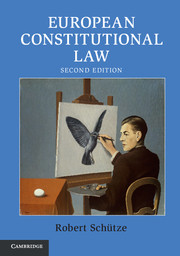Book contents
- Frontmatter
- Dedication
- Summary Contents
- Contents
- List of Illustrations
- List of Tables
- List of Cases
- List of Secondary Law
- Table of Equivalents
- List of Abbreviations
- Acknowledgements
- Introduction: European Constitutional Law
- Part I Constitutional Foundations
- Part II Governmental Powers
- Appendices
- Index
Introduction: European Constitutional Law
- Frontmatter
- Dedication
- Summary Contents
- Contents
- List of Illustrations
- List of Tables
- List of Cases
- List of Secondary Law
- Table of Equivalents
- List of Abbreviations
- Acknowledgements
- Introduction: European Constitutional Law
- Part I Constitutional Foundations
- Part II Governmental Powers
- Appendices
- Index
Summary
‘The life of the law has not been logic; it has been experience.’ But if it is the fate of the common law to ‘stumbl[e] into wisdom’, this should be less true of the civil law. For it is the task of legal codes to order experiences into a logical system of norms. Constitutional law is – more often than not – codified law. Most constitutional orders are based on a written constitution; and this written constitution is designed to establish a system of rules that provide the ‘grammar of politics’. Learning constitutional law is thus like learning a language. One cannot only learn the words expressing different experiences. One also needs to study the grammatical system that binds these words together. Yet constitutional law is of course not all about logical rules. As in a language, there exist exceptions and next to the exceptions exist absurdities! These are often the result of historical experiences; and constitutional law will therefore always be about logic and experience. It is the place where political theory meets historical reality.
The object of constitutional law is the ‘constitution’. But what is a ‘constitution’? From a purely descriptive point of view, constitutions simply reflect the institutions and powers of government. From a normative perspective, on the other hand, constitutions are to ‘order’ societies according to a particular political philosophy. Normative constitutions thus do not merely reflect the existing ‘government’ but prescribe its composition and powers. Yet in order to be able to set normative limits to a government, the constitution must be above the government. The normative definition of constitution therefore defines it as the highest law within a society. The constitution has an elevated position above the ordinary law governing a society. (Its higher status is often achieved by prohibiting constitutional changes through simple legislation. Constitutions can here only be amended by ‘constitutional’ amendment.) Formally, then, a constitution is best defined as the collection of those norms that ‘constitute’ a society's highest laws. Within the last two hundred years, this formal definition has however competed with a material understanding of what a constitution ought to be. This second definition links the concept of constitution to particular political principles. Following the ‘liberal’ principle, a constitution should thus establish the rule of law and a separation of powers.
- Type
- Chapter
- Information
- European Constitutional Law , pp. lxiii - lxviiiPublisher: Cambridge University PressPrint publication year: 2015



